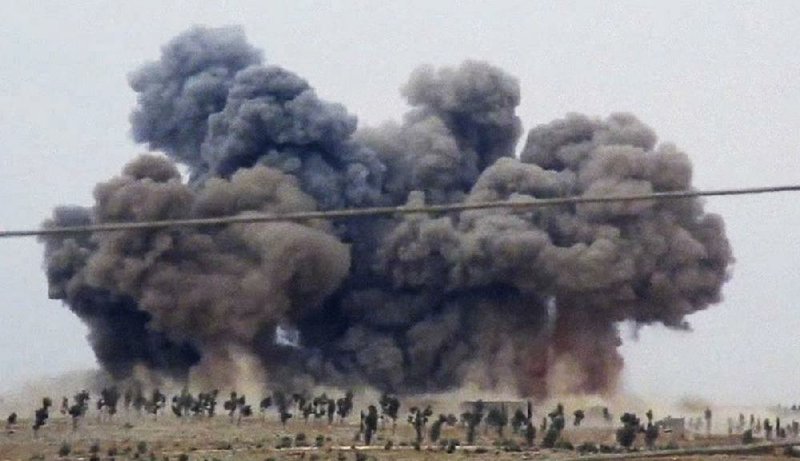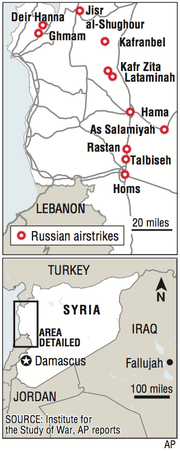MOSCOW -- As Russian warplanes carried out a second wave of airstrikes Thursday in Syria, Moscow defended its military involvement against Western criticism of its intentions, saying it sees "eye to eye" with the U.S.-led coalition campaign on its targets in the country.
RELATED ARTICLE
http://www.arkansas…">Cotton condemns Russian airstrikes
The claim of agreement with Washington came among conflicting reports about Russia's intentions in Syria and whether it is targeting only Islamic State and al-Qaida-linked militants.
The U.S. and its allies fear that Russia, which has backed the family of President Bashar Assad since Assad's father was in power, is using the air campaign as a pretext to go after anti-Assad rebels that include CIA-supported groups.
Russian jets appeared to be primarily bombing central and northwestern Syria, strategic regions that are the gateway to Assad's strongholds in the capital, Damascus, and the coast.
On Thursday, warplanes hit locations of a U.S.-backed rebel group, Tajamu Alezzah, in the central province of Hama, said the Britain-based Syrian Observatory for Human Rights. It said Tajamu Alezzah also was targeted a day earlier.
Idlib province appeared to bear the brunt of the attacks, activists said. The province is controlled by a coalition of rebel groups that include the al-Qaida-linked Jabbat al-Nusra.
Russian Defense Ministry spokesman Igor Konashenkov said its aircraft damaged or destroyed 12 targets in Syria belonging to the Islamic State, including a command center and two ammunition depots. Officials acknowledged, however, that other unidentified groups were being targeted as well.
Russia sent more than 50 aircraft on about 30 sorties over Syria, using drones and satellites to identify targets, Konashenkov said. They were able to deploy quickly, he said, because ammunition and other supplies had been stockpiled at the Tartus naval base on Syria's Mediterranean coast, Russia's only military site outside the former Soviet Union.
One of the airstrikes hit near a mosque in the city of Jisr al-Shughour, which fell in April to rebel groups including the al-Qaida-linked Nusra Front, according to the Observatory. A video showed damage to the mosque and a man could be heard saying that one person was killed.
The Russian state news agency RIA reported that airstrikes by the Syrian military, which is working with the Russian air force, had killed 107 militants, including three commanders of the Nusra Front near Homs.
Speaking Thursday at the United Nations, Russian Foreign Minister Sergey Lavrov rejected suggestions that the Russian airstrikes were to shore up support for Moscow's main ally in the Middle East.
He insisted Russia was targeting the same militant groups as the U.S.-led coalition, which is conducting its own airstrikes in Syria: the Islamic State, also known as ISIL, the Nusra Front and other groups.
"I would recall that we always were saying that we are going to fight ISIL and other terrorist groups," he said. "This is the same position which the Americans are taking. The representatives of the coalition command have always been saying that their targets are ISIL, al-Nusra and other terrorist groups. This is basically our position as well. We see eye to eye with the coalition on this one."
Lavrov added: "If it looks like a terrorist, if it acts like a terrorist, if it walks like a terrorist, if it fights like a terrorist, it's a terrorist, right?"
Asked if he agreed with Lavrov, U.S. Secretary of State John Kerry said: "Well, in concept."
"What is important is Russia has to not be engaged in any activities against anybody but ISIL," Kerry said. "That's clear. We have made that very clear."
Lavrov's speech was largely in response to comments from French Defense Minister Jean-Yves Le Drian, who said Russian warplanes "didn't hit Islamic State," and from U.S. Defense Secretary Ashton Carter, who also had said the Russians appeared to have targeted areas that did not include Islamic State militants.
Syria's ambassador to Russia, Riad Haddad, held a news conference Thursday in which he gave full support to everything the Russian military was doing.
The attacks were all carried out in coordination with the Syrian military, he said, adding that it did not matter who was being attacked because all of the groups fighting the government were "terrorists" who subscribed to the same goals as the Islamic State.
"We in Syria encounter various armed terrorist groups, and regardless of what they are called, they all pursue the same terrorist goals," Haddad said, citing the Nusra Front, the Islamic State and the Free Syrian Army as examples.
He referred to the airstrikes near the cities of Homs and Hama as the fruit of Syrian information combined with Russian firepower.
"There are precise position data for the places where the terrorist groups are," Haddad said. "This is why the airstrikes are carried out only against the positions of the Islamic State in some cities or outskirts, like, for example, of Homs and Hama."
'Dumb Bombs' Reported
As concerns grew about a conflict that has now drawn in warplanes from the world's two most powerful militaries, Russian President Vladimir Putin denied reports that civilians were killed in any Russian airstrikes.
"We are ready for such information attacks," he said in a live broadcast from the Kremlin. "The first reports of civilian casualties came even before our jets took off."
Syrian opposition groups have maintained that the first day of Russian airstrikes killed 36 civilians, including children. Russian officials have denied it, but Lt. Gen. Robert Otto, deputy chief of staff for intelligence and surveillance for the U.S. Air Force, suggested that Russia's tactics would invariably result in civilian casualties and trigger a backlash against the Kremlin.
Otto said the Russians have been dropping "dumb bombs" -- munitions that are not precision-guided. The use of such indiscriminate targeting could lead to the deaths of innocent civilians, he said, and create more terrorists than they kill.
"To me, it was representative of what you'd expect from dumb bombs, being dropped from airplanes at medium altitudes, which is not that impressive," Otto told journalists from the Defense Writers Group. "If they approach this with indiscriminate bombing, then I think it's going to create second or third effects for them."
In contrast, Otto said the U.S. military and its allies have been exceptionally cautious in selecting targets in Syria and Iraq, to the point of slowing down their campaign of airstrikes until they can be sure that no civilians are present. In addition to using guided weapons, the U.S.-led coalition relies heavily on drones and other surveillance aircraft to observe potential targets before approval is given to strike.
"Our approach has been to be very cautious with the application of force," he said. "If at the end of the day you inadvertently kill innocent men, women and children, then there's a backlash from that. And so we might kill three and create 10 terrorists."
The Pentagon began talks via videoconference with Russian military officials on ways to avoid U.S. and Russian forces firing on each other in Syria.
Otto said that even as the U.S. tries to ensure Russian airstrikes don't conflict with coalition operations in Syria, he does not believe there will be any real intelligence-sharing with Moscow.
"I have a low level of trust in the Russians. It's trust but verify," he said. "It's easy, then, to exchange factual data where you're going to operate. I would not envision a relationship where I would share some of my intelligence with them."
In Paris, Russian Ambassador Alexander Orlov said Russian officials warned the U.S. "via confidential channels" of where they planned to strike. He also noted a coordination center was being set up in Baghdad that would include Syrians, Iraqis, Iranians and Russians -- and any other country that wants to participate.
References to 'Terrorists'
Kremlin spokesman Dmitry Peskov acknowledged to reporters Thursday: "Of course the goal is to help the Syrian army where it is weakest. Yes, that is right. The weak points are where the Syrian army is fighting against IS and other terrorist groups."
Hundreds of Chechens and Central Asian fighters have joined the battles in Syria since the early days of the civil war, and many form the backbone of al-Nusra and Islamic State. Some of those Chechen extremists are part of the coalition that controls Idlib.
Putin has said Russia would be fighting "gangs of international terrorists." The Syrian government uses the word "terrorists" to describe all rebel groups.
A government soldier serving in Homs province said the Russian military support had arrived just in time. "Without the Russians," he said, Islamic State forces could have reached the provincial capital of Homs, "and I don't just think so, I'm sure.
"It should have started a long time ago," he added, speaking by phone and asking not to be identified for fear of repercussions for speaking to a foreign news outlet. "Now, half the people have died or emigrated."
Iran's Foreign Ministry said it fully supports Russian airstrikes against "terrorist groups" in Syria.
The "Islamic Republic of Iran considers military action by Russia against armed terrorist groups to be a step toward fighting terrorism and toward resolving the current crisis" in Syria, said ministry spokesman Marzieh Afkham in a statement carried by the official IRNA news agency.
The U.S. and Russia agree on the need to fight the Islamic State but not about what to do with Assad. The Syrian civil war, which grew out of an uprising against the longtime leader, has killed more than 250,000 people since March 2011 and sent millions fleeing elsewhere in the Middle East and Europe.
Lavrov also said Russia did not plan to carry out airstrikes against Islamic State militants in Iraq, which has seen large parts of its territory overrun by the extremists. "We are polite people; we don't come if not invited," Lavrov said.
Iraqi Prime Minister Haider al-Abadi told France 24 television he would welcome Russian airstrikes in his country if Moscow made such a proposal, but that it hasn't happened yet.
"If we get the offer, we [will] consider it. In actual fact, I would welcome it," he said, noting that he has been in contact with Putin.
Information for this article was contributed by Jim Heintz, Nataliya Vasilyeva, Kate de Pury, Lori Hiinant, Sarah El Deeb, Robert Burns, Lolita C. Baldor, Ken Dilanian, Edith M. Lederer, Cara Anna and Zeina Karam of The Associated Press; by Anne Barnard, Andrew E. Kramer, Hwaida Saad, Maher Samaan and Neil MacFarquhar of The New York Times; and by Craig Whitlock of The Washington Post.
A Section on 10/02/2015




